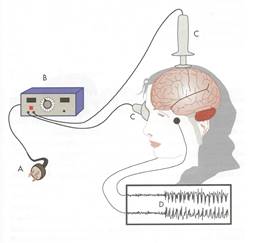- Home
- Editorial
- News
- Practice Guidelines
- Anesthesiology Guidelines
- Cancer Guidelines
- Cardiac Sciences Guidelines
- Critical Care Guidelines
- Dentistry Guidelines
- Dermatology Guidelines
- Diabetes and Endo Guidelines
- Diagnostics Guidelines
- ENT Guidelines
- Featured Practice Guidelines
- Gastroenterology Guidelines
- Geriatrics Guidelines
- Medicine Guidelines
- Nephrology Guidelines
- Neurosciences Guidelines
- Obs and Gynae Guidelines
- Ophthalmology Guidelines
- Orthopaedics Guidelines
- Paediatrics Guidelines
- Psychiatry Guidelines
- Pulmonology Guidelines
- Radiology Guidelines
- Surgery Guidelines
- Urology Guidelines
Researchers caution on risks of self-administered brain stimulation(tDCS)

The growing trend of "do-it-yourself" transcranial direct current stimulation (tDCS) poses hidden risks to healthy members of the public who seek to use the technique for cognitive enhancement. Researchers from the Perelman School of Medicine at the University of Pennsylvania and Beth Israel Deaconess Medical Center, a Harvard Medical School teaching hospital, along with several members of the (cognitive) neuroscience research community warn about such risks involved in home use of tDCS, the application of electrical current to the brain. Their Open Letter will appear in the July 7th issue of Annals of Neurology.
tDCS devices are made up of a band that wraps around one's head with electrodes placed at specific scalp locations to target specific brain regions which transmit varying levels of electrical current to the brain to achieve the desired result, such as an enhanced state of relaxation, energy, focus, creativity, or a variety of other goals. Because tDCS devices are easily made from simple tools, the practice of self-administered brain stimulation by the lay community has grown in recent years.
Cognitive neuroscience research suggests that tDCS can enhance cognition, and relieve symptoms of anxiety, depression, and other conditions.
"Published results of these studies might lead DIY tDCS users to believe that they can achieve the same results if they mimic the way stimulation is delivered in research studies. However, there are many reasons why this simply isn't true," said first author, Rachel Wurzman, PhD, a postdoctoral research fellow in the Laboratory for Cognition and Neural Stimulation at Penn. "It is important for people to understand why outcomes of tDCS can be unpredictable, because we know that in some cases, the benefits that are seen after tDCS in certain mental abilities may come at the expense of others."
The "Open Letter" is signed by 39 researchers who share this sentiment, representing an unprecedented consensus among tDCS experts.
"Given the possibility that the improper use of our articles might cause harm, as a community we felt it necessary -- an ethical obligation -- to explain in a peer-reviewed journal why it is that we generally do not encourage do-it-yourself use of tDCS," she said.
Their Letter details the scientific community's many reasons for concern.
First, it is not yet known whether stimulation extends beyond the specific brain regions targeted. These indirect effects may alter unintended brain functions. "We don't know how the stimulation of one brain region affects the surrounding, unstimulated regions," said co-author Roy Hamilton, MD, MS, an assistant professor of Neurology and director of the Laboratory for Cognition and Neural Stimulation at Penn. "Stimulating one region could improve one's ability to perform one task but hurt the ability to perform another."
In addition, what a person is doing during tDCS -- reading a book, watching TV, sleeping -- can change its effects. Which activity is best to achieve a certain change in brain function is not yet known.
Wurzman, Hamilton and colleagues go on to say that they have never performed tDCS at the frequency levels some home users experiment with, such as stimulating daily for months or longer. "We know that stimulation from a few sessions can be quite lasting, but we do not yet know the possible risks of a larger cumulative dose over several years or a lifetime," they wrote.
The authors also suggest that small changes in tDCS settings, including the current's amplitude, stimulation duration and electrode placement, can have large and unexpected effects; more stimulation is not necessarily better.
Finally, the group warns that the effects of tDCS vary across different people. Up to 30 percent of experimental subjects respond with changes in brain excitability in the opposite direction from other subjects using identical tDCS settings. Factors such as gender, handedness, hormones, medication, etc. could impact and potentially reverse a given tDCS effect. And, most research is conducted for the purpose of treating disease, with the goal of alleviating symptoms, with a detailed disclosure or risks as required of studies of human research subjects. The level of risk is quite different for healthy subjects performing tDCS at home.
"Home users of tDCS devices need to be aware that we do not really understand how stimulation brings about the intended results or how surrounding brain regions are affected, but we do know that the brain changes they bring about may be long-lasting, for better or worse,"
Beth Israel Deaconess Medical CenterHarvard Medical School teaching hospitalLaboratory for Cognition and Neural StimulationRachel WurzmanRoy HamiltontDCSTranscranial Direct Current StimulationUniversity of Pennsylvania
Source : Science DailyNext Story
NO DATA FOUND

Disclaimer: This site is primarily intended for healthcare professionals. Any content/information on this website does not replace the advice of medical and/or health professionals and should not be construed as medical/diagnostic advice/endorsement or prescription. Use of this site is subject to our terms of use, privacy policy, advertisement policy. © 2020 Minerva Medical Treatment Pvt Ltd